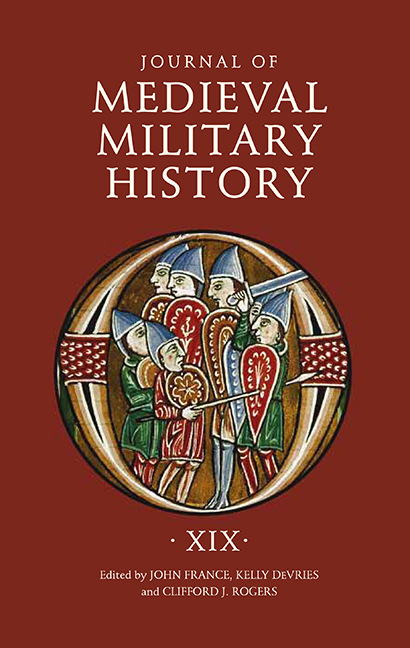Book contents
- Frontmatter
- Contents
- List of Illustrations
- 1 The Battle of Firāḍ: The Day on Which Khālid b. al-Walīd Did [Not] Defeat Both Byzantines and Persians
- 2 A Mislocated Battlefield? Battle Flats: The Battle of Stamford Bridge, 1066
- 3 The Frankish Campaign of 1133–1134 in Northern Syria and the Battle of Qinnasrīn
- 4 Bella Plus Quam Civilia? The Place of Battle in the Context of Civil War under the Anglo-Norman and Angevin Kings, c. 1100–c. 1217
- 5 Edward I’s War on the Continent, 1297–1298: A New Appraisal
- 6 The Earliest European Recipes for “Powder for Guns” (1336 and 1338–c. 1350)
- 7 Bellicose Rhetoric: The Memorable War Speeches of One Aragonese Royal Couple
- 8 Coureurs and Their Role in Late Medieval Warfare
- List of Contributors
- Journal of Medieval Military History 1477–545X
5 - Edward I’s War on the Continent, 1297–1298: A New Appraisal
Published online by Cambridge University Press: 02 June 2021
- Frontmatter
- Contents
- List of Illustrations
- 1 The Battle of Firāḍ: The Day on Which Khālid b. al-Walīd Did [Not] Defeat Both Byzantines and Persians
- 2 A Mislocated Battlefield? Battle Flats: The Battle of Stamford Bridge, 1066
- 3 The Frankish Campaign of 1133–1134 in Northern Syria and the Battle of Qinnasrīn
- 4 Bella Plus Quam Civilia? The Place of Battle in the Context of Civil War under the Anglo-Norman and Angevin Kings, c. 1100–c. 1217
- 5 Edward I’s War on the Continent, 1297–1298: A New Appraisal
- 6 The Earliest European Recipes for “Powder for Guns” (1336 and 1338–c. 1350)
- 7 Bellicose Rhetoric: The Memorable War Speeches of One Aragonese Royal Couple
- 8 Coureurs and Their Role in Late Medieval Warfare
- List of Contributors
- Journal of Medieval Military History 1477–545X
Summary
This study of Edward I of England's expedition to Flanders in 1297 seeks to re-evaluate the king's aims and achievements. Previous accounts have been largely negative in their assessment of Edward's performance, but this article argues that his sojourn in Flanders should not be regarded as a failure. The actions of Edward's allies and the wider context of his strategic objectives, along with the difficulties and setbacks he encountered, are given particular consideration.
Edward I's Flanders campaign of 1297–1298 is regarded as one of his least successful ventures. His intention was to defeat the French under Philip IV and recover his confiscated duchy of Gascony. The English king, it has been said, arrived too late to help his Flemish allies, already on the brink of defeat, and with a totally inadequate army. No engagements were fought, except a number of brawls between English sailors and allied infantry. On top of this lack of military success, the king was severely embarrassed financially, and in the end fortunate to extricate himself from a difficult situation.
Such is the general view from the perspective of English historians. This article will seek to re-evaluate Edward's war aims, as well as demonstrate that the English king made vital gains in Flanders, even if victory eluded him. While the main focus of the article is on Edward and his perspective, it will also consider those of his enemy, Philip, and his ally, Count Guy of Flanders.
Gascony was one of just two continental possessions left to Edward's dynasty, held after the Treaty of Paris in 1259 as a fiefdom of the French crown. In the treaty Henry III formally renounced his family claims to the former Angevin territories of Normandy, Anjou, Maine, Touraine and Poitou. Edward first received Gascony as part of a substantial endowment granted to him by his father in 1254, part of the settlement for his wedding to Eleanor, daughter of the king of Castile. Edward governed the duchy in peace for the next forty years, bar a brief campaign in 1273 against a rebellious vassal, Gaston de Béarn. His personal rule oversaw the foundation of over fifty new bastide towns and efficient reorganization of government.
- Type
- Chapter
- Information
- Journal of Medieval Military HistoryVolume XIX, pp. 77 - 118Publisher: Boydell & BrewerPrint publication year: 2021



